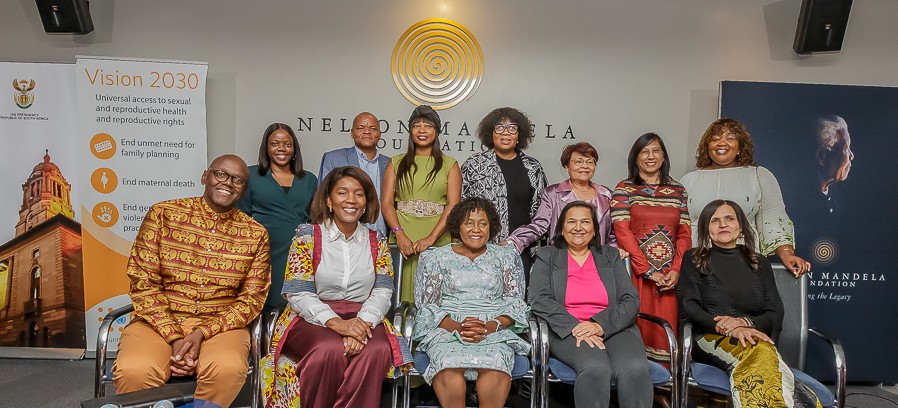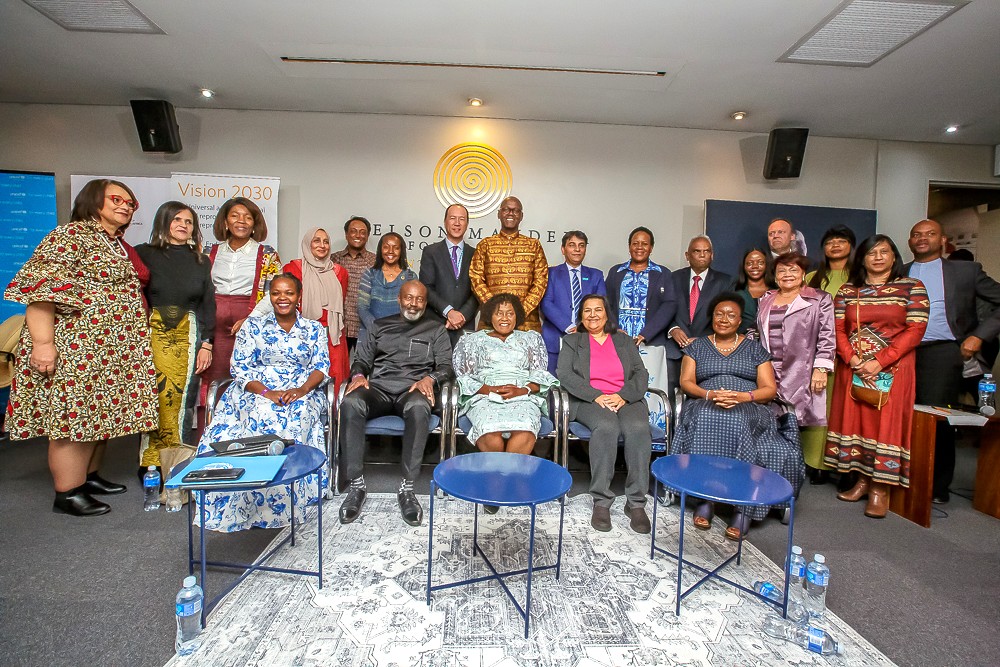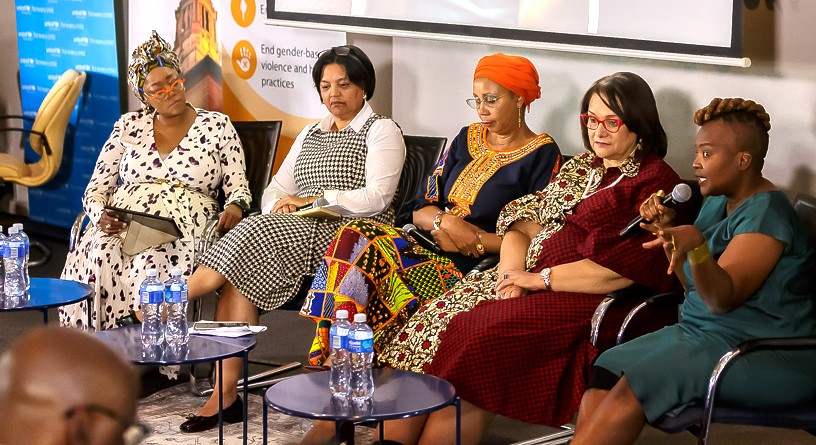A life in service: Professor Olive Shisana at the Farewell Tribute
If Shakespeare were writing Marc Antony’s famous eulogy from Julius Caesar today and in a South African context, he would probably have said, “The good that South Africa and South Africans do is oft interred with their bones.” These adapted words from Shakespeare, shared by Professor Olive Shisana during her farewell tribute, reverberated across the room at the M&G Critical Thinking Forum on 9 May 2025—marking the end of a distinguished chapter in public service, but not the end of her mission.
Professor Shisana, renowned for her fearless feminist leadership and scientific rigor, closed her formal role as Special Adviser to President Cyril Ramaphosa with characteristic humility and purpose. “Today is a deeply emotional occasion for me—emotion is not a word often associated with scientists!” she quipped, striking a delicate balance between heartfelt reflection and resolute optimism.
For over three decades, Professor Shisana has stood at the helm of South Africa’s transformation efforts—shaping public health policy, advancing gender justice, and anchoring evidence-based governance. In her six-and-a-half-year tenure within the Presidency, she served not only as a technical adviser but as a moral compass on issues affecting the nation’s most vulnerable.
 Professor Olive Shisana with the Presidency team
Professor Olive Shisana with the Presidency team
“Being Special Adviser to the President was not merely a role—it was a calling,” she said. “Together, we navigated some of the most complex challenges of our democratic dispensation.”
Transforming the Gender Landscape
Her legacy is perhaps most visible in the national response to gender-based violence and femicide (GBVF), elevating it to a national issue. From galvanizing the Women’s March to the Union Buildings in 2018 to steering the development of the Ten-Year National Strategic Plan on GBVF, Professor Shisana helped elevate gender justice to a national priority.
“We fought for the rights of girls and boys, and even men, recognising GBV as a societal crisis that demands collective action.”
Under her leadership, research into femicide and HIV prevalence studies gained traction, legal and policy reforms were catalysed, and accountability structures emerged across institutions. “We must now double down on prevention,” she urged, reminding stakeholders that the work was far from over.
Beyond our borders, her efforts rallied behind the AU End Gender-Based Violence Convention, which the African Union has now approved. The work continues to ensure its ratification in at least 11 countries so that it may take full effect.
 Professor Shisana’s peers and colleagues reflecting on her work
Professor Shisana’s peers and colleagues reflecting on her work
A Blueprint for the Future
Her work extended beyond gender justice. “We worked tirelessly on the National Health Insurance (NHI), ensuring it was thoroughly developed, consulted upon, submitted to Cabinet and Parliament, and signed into law—a significant leap toward universal healthcare access,” she recalled.
It is no minor achievement.
She continued reminiscing … “we forged the Five-Year Presidential Health Compact to strengthen our healthcare system and then renewed our commitment with yet another Five-Year Compact.”
The forum, which was more than a tribute—it was, as she called it, “a blueprint”—brought together luminaries in health, education, gender equality, and governance. Their testimonies spoke to Shisana’s ability to convene, to inspire, and to act.
Tributes poured in on Professor Shisana’s consistency in amplifying concerns of the most vulnerable populations and effectively elevating these issues to the highest levels of political decision-making, her unwavering advocacy ensured that the needs of marginalised communities were not only heard but also prioritised in national policy dialogues,” she stated.
From co-leading ACT-A globally to advocating for children through the National Strategy to Accelerate Action for Children (NSAAC), Shisana’s fingerprints are all over South Africa’s social development framework.
Speaking highly of Professor Shisana’s long-standing partnership with the UN system, Mr. Nelson Muffuh, the United Nations Resident Coordinator in South Africa, spoke to her visionary leadership, and the transformative role she played in advancing the health and rights of women, children, while stressing the urgency of addressing the ‘unfinished business’ she began: reducing maternal and child mortality, expanding access to sexual and reproductive health rights, and building inclusive health systems.
Professor Shisana’s role in establishing the Global Leader Network for Women, Children, and Adolescent Health, chaired by President Cyril Ramaphosa, was acknowledged. Working together with the Partnership for Maternal, Newborn & Child Health (PMNCH), her “pivotal voice” on global platforms, advocating for Sexual Reproductive Health & Rights, adolescent health, and gender equality moved the agenda forward.
And yet, she was clear-eyed about the challenges.
Indeed, the journey was never easy. Obstacles arose at every turn. Yet, at no point did she ever feel like stopping—”because all of you were there, pushing forward, moving the needle, ensuring progress. Indeed, as our beloved Madiba so often reminded us: “If you want to go fast, go alone. But if you want to go far, go together.”
“Yes, we did all this together. These achievements stand as proof of what collaboration can accomplish. And as we confront the challenges of today and those yet to come, let us never forget that our strength lies in unity. The road ahead is long, but we will rise to achieve our goals together,” she retorted.
“We also did not always communicate our achievements effectively… and we are a nation preoccupied with negativity,” she noted. “The refrain is often, ‘Nothing was done.’ But we know this is not true. The data, the policies, the lives changed—they tell another story.”
A Call to Remember—and to Act
Her remarks were not only a recollection of past work, but also a rallying cry for those who remain in the trenches. To civil society leaders like Masimanyane and the Initiative for Strategic Litigation in Africa (ISLA), she extended heartfelt appreciation. To global donors and development partners—from the Ford Foundation and the Gates Foundation to the United Nations agencies—she offered thanks on behalf of all South Africans whose lives were touched by their contributions.
With grace and gratitude, she acknowledged her family—her husband of over 50 years, William, and their children Nkateko and Fumani—as her rock and reservoir of strength.
To President Cyril Ramaphosa, she offered praise for his willingness to engage deeply, listen closely, and lead steadfastly during times of profound crisis.
 Partners and colleagues celebrating with Professor Shisana
Partners and colleagues celebrating with Professor Shisana
The Journey Continues
While her formal role in government ends, Shisana’s parting message was clear: “My commitment remains unwavering.” Through her private organisations and continued advocacy, she will carry forward the work of transforming institutions, driving gender equality and building systems that leave no one behind.
As she said:
“Even some of the world’s most advanced democracies did not attain such progress in 32 short years. We must never lose sight of this.”
Let this moment serve not as a goodbye, but as a continuation—of her example, her lessons, and her enduring belief that science, leadership, and humanity must work hand in hand.